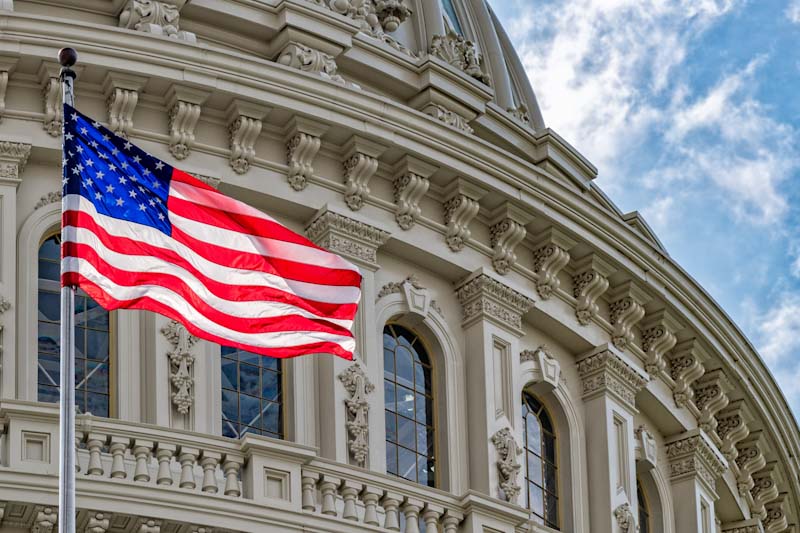This website uses cookies so that we can provide you with the best user experience possible. Cookie information is stored in your browser and performs functions such as recognising you when you return to our website and helping our team to understand which sections of the website you find most interesting and useful.
News
Legislative Update—Trade Talks, Appropriations & Recycling
USMCA
House Ways and Means Chairman Richard Neal (D-MA) and four Democratic House members traveled to Mexico this week to meet with government officials and local workers on labor and enforcement issues. The returning members said they are not yet satisfied with Mexico’s progress and want to see full implementation. Many Democrats and U.S. labor officials are concerned that Mexico’s 2020 budget is not providing enough funding to implement its new labor reform laws. Sources report that a recent meeting between House Speaker Nancy Pelosi (D-CA) and Mexican officials on the issue has “ended poorly.” Furthermore, American Federation of Labor and Congress of Industrial Organizations (AFL-CIO) President Richard Trumka told The Washington Post it would be a “colossal mistake” for the House to vote soon on the trade agreement while asking Democrats to cave to Republican pressure to move quickly on the deal.
Both the White House and Speaker Pelosi are working to pass the United States-Mexico-Canada Agreement (USMCA) this fall. The Speaker emphasizes that Democrats are on a “continued path to yes” despite the impeachment inquiry. The trade working group and Pelosi have been engaged with United States Trade Representative (USTR) Robert Lighthizer over the recess and are expecting a response to their counterproposal as early as this week.
China Trade Talks
U.S. and Chinese officials will meet this week for another round of trade negotiations. Deputy-level discussions started Monday and Tuesday and senior-level officials, including USTR Lighthizer, Treasury Secretary Steven Mnuchin, and Chinese Vice Premier Liu He who will meet today and tomorrow. China had resumed buying U.S. soybeans in September, including a substantial purchase right before the upcoming meetings. The meetings also come just as the administration has been exploring ways to restrict China’s capital flows between the U.S. and China. This is a sensitive subject for China, and it is unclear what the outcome might mean for the trade talks.
Appropriations
The Senate approved (82-15) a stop-gap spending bill (HR 4378) to avoid a government shutdown. President Donald Trump signed the continuing resolution allowing the government to continue running through Nov. 21 and giving time for members of Congress to work on passing the $1.4 trillion yearly appropriations that continue to be hung up. Meanwhile, the Senate Appropriations Committee also advanced several FY2020 appropriations bills out of committee before leaving for recess. The committee passed its version of the FY2020 Interior-Environmental spending bill but did not include the House Appropriations provision directing the Environmental Protection Agency (EPA) to develop a national recycling strategy. The Senate Appropriations Committee report does include language encouraging EPA “to consider developing a definition of ‘recycling’ to allow for better tracking and understanding of the performance of the different beverage and food packaging substrates, including glass, plastic, aluminum, cardboard, tetra pack and others, including whether or not products are efficiently and effectively recycled.” Differences between the bills will have to be worked out in reconciliation.
Recycling
Before leaving for recess, the Senate advanced two bills, S. 2260 and S. 2372, that are also part of a broader bipartisan package (S. 1982) to help reduce and find uses for plastic waste. The “Save our Seas 2.0” (S. 1982) package and stand-alone bills were introduced by Senators Dan Sullivan (R-AK), Sheldon Whitehouse (D-RI), and Bob Menendez (D-NJ). S. 2260 focuses on improving domestic infrastructure through grants and a new state revolving loan fund and would authorize $10 million annually from 2021 through 2025 for three other new grant programs on drinking water infrastructure, wastewater infrastructure, and trash-free waters. On Sept. 25, the Environment and Public Works Committee reported S. 2260 favorably to the full Senate with an amendment. An amendment from Ranking Member Tom Carper (D-DE) removed language supported by the plastics industry calling for a National Academy of Sciences study on chemical recycling. Carper had concerns around incineration, which some environmental groups oppose.
The Senate Foreign Relations Committee unanimously passed a substitute amendment of S. 2372, which focuses on enhancing global engagement by formalizing U.S. policy on international cooperation on combating marine debris, enhancing the National Oceanic Atmospheric Administration (NOAA) and EPA’s international outreach, and directing the administration to maintain global leadership on the issue and explore the possibility of including marine debris in international agreements. There is an additional stand-alone bill (S. 2364) in the package, which was referred to the Commerce Committee and has yet to be considered. This portion focuses on enhancing the domestic marine debris response. Rep. Suzanne Bonamici (D-OR) has introduced the House version of the bill (H.R. 3969), which also has broad bipartisan support and was referred to seven House committees.


